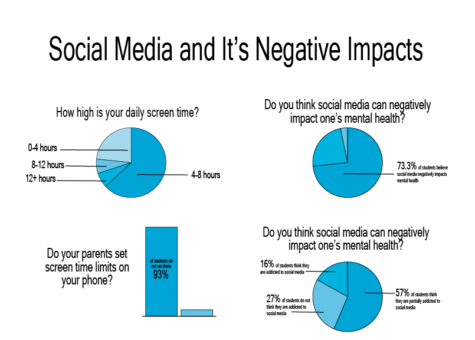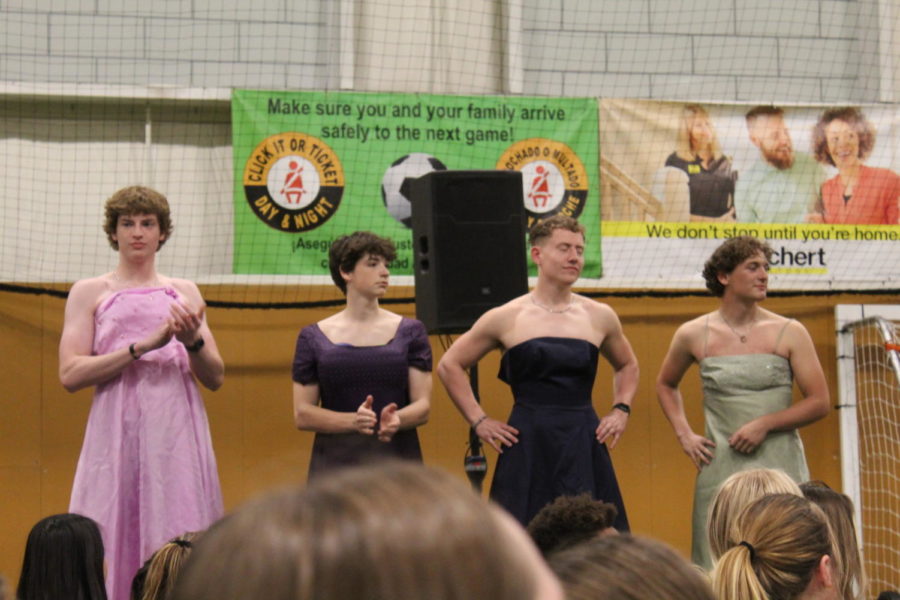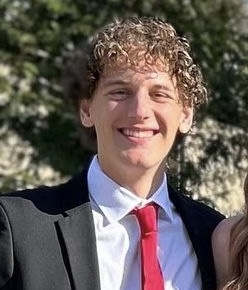A Social Society
BV students share experiences with social media
Boosting Business
senior takes opportunity of apps for business

With an increasingly interconnected world and the rapid spread of news and ideas, social media has been used as an outlet for creativity and a way to promote businesses. This is especially true for senior Alexis Forgy, who has been using Instagram since 2020 to showcase her artistic skills.
“I use [social media] to promote my photography business,” Forgy said. “I also like to use it to get new ideas for inspiration for my photography.”
With over 900 followers and a website, Forgy has been using her account to post the pictures she’s taken at different events. This includes school events—like sports games or school dances—Kansas City Fashion Week, senior graduation photos, and product shots. Using social media has benefitted Forgy in more ways than one.
“It’s allowed me to share my photography with other people,” Forgy said. “People have found me through social media that they wouldn’t have found me otherwise, so it’s definitely helped a lot.”
Forgy believes social media has both its upsides and downsides.
“I think it’s good to an extent,” she said. “There are things that can come from it that aren’t great, but I think if you’re using it the right way, it’s very beneficial for businesses and other things like that.”
Setting her photography business aside, Forgy uses social media for her own enjoyment as well. Social media can be used for a variety of different reasons, such as keeping up with friends and family, staying up to date with current and crucial events, or even just filling up spare time.
“I definitely spend too much time on social media,” Forgy said. “I wish I could limit myself more, but it’s just so addicting—I’m always on it.”
Yet, there are a plethora of negative effects social media has on people, especially without moderation. Students can feel left out or disconnected from peers without the use of social media. With societal pressure to download certain apps, some can disregard the negative effects it has. For Forgy, it’s something that she tends to try not thinking about.
“I don’t really think about the effects social media has on me,” she said. “I think I’m a pretty positive person. So, it’s never really come to [a point] where I’m trying to figure out how it affects me.”
Sides of Social Media
sophomore discusses pros and cons of social media

At any given moment, millions of people around the world are checking their social media. With the uses of social media being nearly endless, it is no surprise that its effects on people’s lives can widely vary. For sophomore Aidan Kern, social media can be just as beneficial as distracting.
“I’m less focused on everything,” Kern said. “[Social media] takes me away from focusing on schoolwork. I don’t want to say I’m addicted to it, but I pretty much am at times.”
The consequences of social media go beyond being distracting. Social media can provide an easy platform for hate and misinformation to spread.
“There’s a lot of negativity on it, cyberbullying definitely has an impact,” Kern said. “Even on stuff that I post, there’s negativity and false claims just all throughout it.”
However, not all the effects of social media are unwelcome. Social media can also provide a view into world events and keep people connected and up-to-date.
“[I use social media] for posting stuff and getting caught up on media and news,” Kern said. “It provides an accurate news source. And I’m focused on content and stuff like that for YouTube.”
Despite using social media frequently and acknowledging its benefits, Kern believes that social media should never take priority over real life.
“People should focus on their work more than social media,” Kern said.
Unplugged
junior shares experience without social media apps
The effects of social media can hit oneself emotionally, psychologically and physically. But one of the biggest impacts social media can have is mentally. In today’s society, many teens care about their mental health, as well as taking time to do so. Junior Nathan Ginther is one of many teens at Blue Valley High who have taken steps against social media to better their mental state.
“I decided to [get rid of social media] because I noticed I wasn’t who I wanted to present myself as on social media versus who I really am — a lot of the time I was being somebody I wasn’t,” Ginther said. “It was a lot of different little things that added up to a decision where I knew I wasn’t going to be the best person I could be if I was living two different lives.”
After taking time to research the psychological damage Ginther believes social media can cause, he made some discoveries about his own mentality.
“ I have less stress and anxiety built on trying to impress people on social media for totally obligatory reasons,” he said. “I was trying to present myself and always trying to look a way that wasn’t who I was. I was trying to reach an unrealistic goal that just didn’t exist.”
Because of his decreased amount of time spent on his phone, Ginther feels as if he has made better connections with the people in his life, as well as being able to live in the moment.
“When I text people now, I have to be more intentional about what I write and have to be more intentional about how I reach out to people. It’s made me have to take a step further than I used to, but it’s made me a better person because of that.”
Despite what many may believe, Ginther stands out in his opinion of the source of the negativity.
“In an ideal world it’s not the person using social media that’s the problem, it’s the tactics that social media uses on people,” he said. “Social media’s goal is entirely to keep their audience a part of it as long as they can, so they’re going to use addictive triggers like notifications. It’s all an attempt to keep people on their websites. I don’t think it’s the users’ job to change much other than [to] start realizing that they’re part of a system to keep them online and understand that there is a way out of that.”
Because of his years spent away from social media, Ginther provides advice for those struggling with the dependency.
“It’s possible to get rid of this addiction — it’s really hard not to and there are so many positive things that come with social media. But the issue is the negatives outweigh the positives so much,” he said. “Take yourself away from it. See what it’s like to spend a week off social media and you’ll realize how hard it is for you. At least let that knowledge point you in the right direction of what’s the better choice for you.”


Rhylan Stern is a senior and it is her third year on staff. While being one of the editors-in-chief, she is a member of Tiger’s Inc. Strategic Marketing...

Ashling Bahadursingh is a senior and it is her third year on staff. She likes fun socks, big earrings, classic literature, and the color green. In...

Jackie Chang is a junior web editor ready for her 2nd year on staff. She loves capturing moments of life and sharing them with others- that’s why her...

Ella Lim is a senior and it is her third year on staff! She is one of the editors-in-chief this year and spent the previous year as a web editor. She is...






